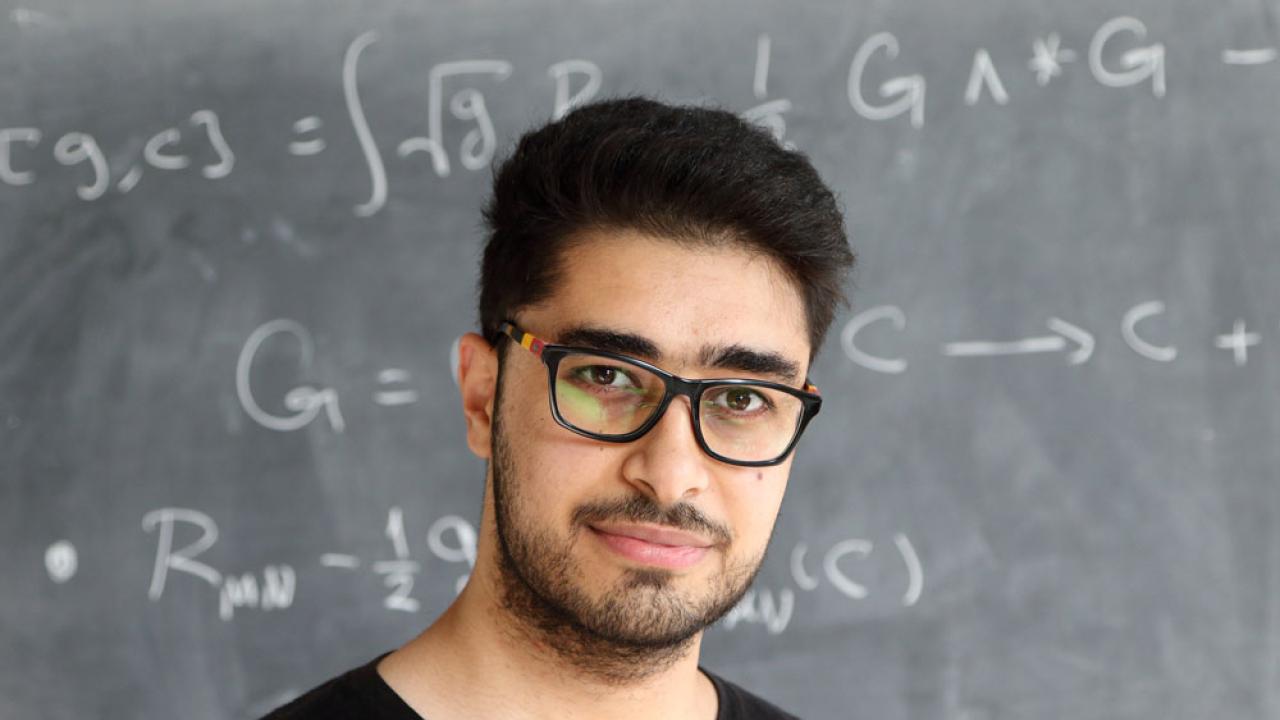
“My story with physics started when I was in high school,” says Marwan Najjar. He remembers his first day of physics class, when his teacher wrote three equations on the blackboard describing particle motion. “In front of these I started wondering if we can describe everything around us, if we can really capture the whole reality of the universe using mathematical equations. It was in that moment that I choose to study physics.”
Najjar was able to pursue that fascination with physics when the ICTP Physics without Frontiers program, founded by ICTP scientist Kate Shaw, organized master classes at Palestinian universities starting in 2012. It was at those classes, in 2013, that Najjar came to know about ICTP and its opportunities. “There was a virtual visit over video conference to the ATLAS control room. We talked with an Arabic researcher, who is working at CERN’s experiment,” he explains. “Then we talked about the Higgs boson during the lecture held by Dr Shaw,” he continued. In 2015, Najjar also attended the Standard Model course held by ICTP Professor Bobby Acharya in Palestine. “I really liked the well-designed syllabus and the intellectual communication that he and the ICTP have created. As a result, I did a lot of research about the ICTP Diploma program and Italy. That’s how I came here,” says Marwan, smiling.
Najjar started the ICTP Diploma program in high-energy physics in the sunny days of late summer 2016. The 23-year-old was born in Jordan to a Palestinian family, who now lives in the West Bank territories. They returned to Palestine when he was two years old. “When we moved from Jordan to Palestine we didn’t have a home” he says, “so my father went to work in the United States to allow us to have a house and study.” Najjar’s father wanted to save money for his children to go to university, which is quite expensive in Palestine.
Before starting the ICTP Diploma Program, Najjar graduated with a bachelor's degree in physics from Birzeit University. “In the first year of my bachelor degree, I realized what kind of physicist I would like to become,” he says. “I chose to be a theorist because I was amazed by how someone can understand the whole reality around themselves with just a paper and pen.” Another reason for his choice was the conditions in his home country: in Palestine there is very little infrastructure and financial support for research and the equipment is old and minimal, due to the huge control deployed by the Israeli military occupation. “There are a lot of restrictions on what equipment can enter Palestine and what cannot, especially on materials needed to study the very basics of science,” he says.
Marwan is not the only in his family who is passionate about science and culture. His mother earned a master's degree in economics and his brother is doing a mechanical engineering and mathematics bachelor degree at the University of Miami. His father studied three years of a bachelor degree in diplomatic science at a German university. However, his studies were disrupted when he visited his family in Palestine and could not return to Germany to complete his degree, because he was not allowed to leave his country again.
It was partially because of these difficulties that during his bachelor degree, Najjar and his colleagues at Birzeit University founded the P-Group, where P means both physics and Palestine. Every Friday, they met in one of their apartments to talk about physics, philosophy, and mathematics, questions about nature and the universe. “Hence, my journey with physics is also a journey of resistance, the only way I find freedom of expression to describe events happening around me,” he says.
Najjar dreams of earning a PhD in high-energy physics and doing research on the fundamental questions about the universe he has been asking since he was in his first high school physics lessons. “My long-term goal is to go back to my homeland, to teach and to be part of hosting international scientific conferences to enhance the contribution of Palestinian scientist to the international scientific community.” For now, there is little possibility for Palestinians students to study 21st century physics, such as high energy and particle physics, cosmology, and general relativity. “We need Palestinian students to go into research at the cutting edge,” he explains, “not just to study classical physics. This is a very crucial point to me because knowledge is power,” he concludes. “It is like having power in your hands.”
--Fernanda Marchiol













